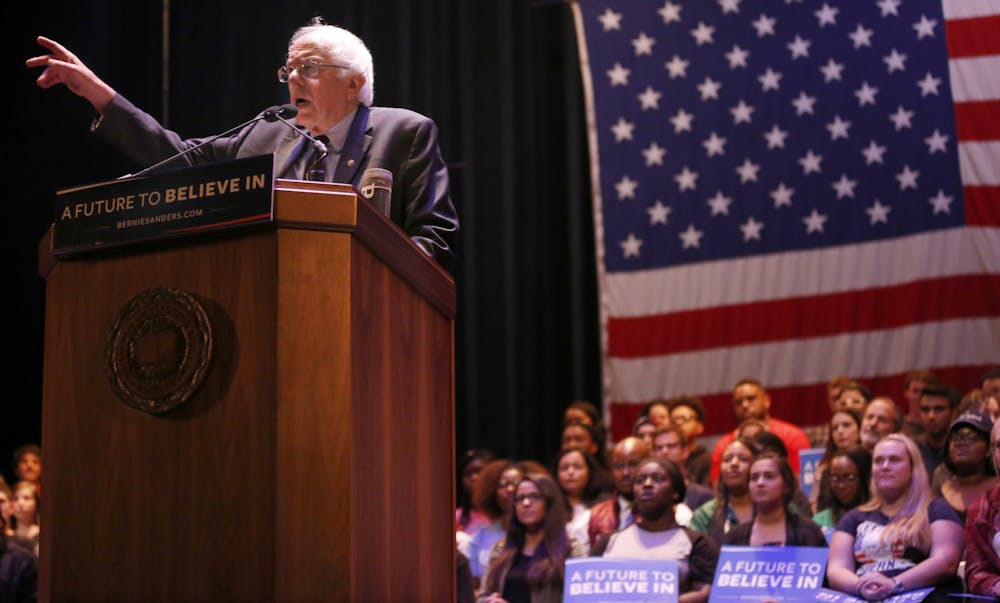Within the very heated health care debate in the Democratic party, the two types of health care plans that are primarily put forth are either a public option such as Mayor Pete Buttigieg’s, D-Indiana, “Medicare For All Who Want It” or single-payer health care like Sen. Bernie Sanders’, I-Vermont, “Medicare For All.”
These plans may be very hard to differentiate for most people especially considering the names are so similar. However, a public option is extremely different from a single-payer system.
A public option introduces a government health care plan into the private health insurance market with the aim of providing more coverage at a lower cost than other private insurance plans. Single-payer health care is where all citizens pay into a single government plan that provides universal coverage to all citizens with health care being free at the point of service.
The main difference is that a public option leaves the private health insurance market in place whereas a single-payer system bans duplicative care through private health care plans and removes the profit-driven incentive structure of privatized health insurance altogether, while still allowing for supplemental private insurance if one so chooses.
A public option may cost less than current private health insurance plans, but single-payer will still be the more cost-effective option overall for the government and individual health care costs.
A public option will not curb rising health care costs because, unlike with a single-payer, having multiple insurance companies allows health care providers to refuse coverage unless your insurer pays out excessively high rents.This leads to higher co-pays, deductibles and premiums to compensate.
A single-payer can control costs by giving the health care providers a monopoly on access to patients which prevents the exploitation of poor patients for profit.
Under the current two-tier system, poor Americans are stuck with poor quality health insurance which restricts them to poor quality health care providers who cannot make higher demands on coverage.
Even if cost was not an object for a public option, introducing a government option into the current private market will lead to this program becoming the insurance of last resort for most Americans.
Since the large private health insurance companies are still left in place, they will use their influence through lobbying and campaign contributions to ensure that the public option is crafted in a way that displaces most of the unhealthiest Americans off private plans and onto the public plan.
The large private insurance companies would still have control over the market, and they will do everything in their power to keep profits up and deny care whenever possible.
A single-payer system puts all Americans on the same plan which grants coverage for all necessary medical treatment, including dental, vision and hearing aids under Sanders’ and Rep. Pramila Jayapal’s, D-Washington, single-payer proposals.
The public option is put forth as a solution which preserves choice in health care, but this could not be further from the truth. A public option would not allow Americans to see their preferred doctors because they may still be “out of network,” and it does not sever the tie between employers and health insurance.
The reality is that a single-payer system provides the most choice because all Americans are covered all under the same network, allowing Americans to choose any doctor because they will all accept the government plan. It would also not force Americans to stay with a particular employer because they like their health insurance.
Americans don’t like their health insurance; they like their doctors and hospitals. Preserving “choice” in health insurance makes no sense, it would be the equivalent of preserving “choice” of fire department or police department when calling 911. The choice that Americans want is choice of health care provider, something that is universally granted to everyone under a single-payer system.
The question that Americans want answers to by these plans is how will this drive down health care costs? Single-payer is proven to be the cheaper solution and it gives Americans the most freedom in their healthcare decisions. Not to mention that a single-payer system is the only system that will provide universal coverage.
Implementing a public option is merely a half-measure which will serve to keep the for-profit middlemen health insurance companies in place. A public option will only erode current government health care programs rather than expand them to help all Americans.
The push for universal health care coverage is an uphill battle and we cannot stop short with watered down plans like a public option.





